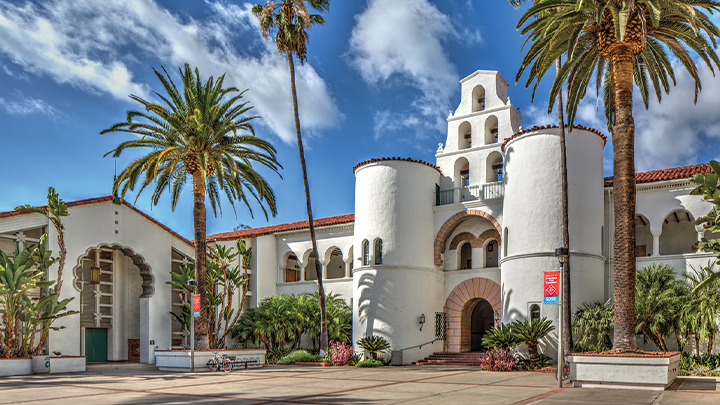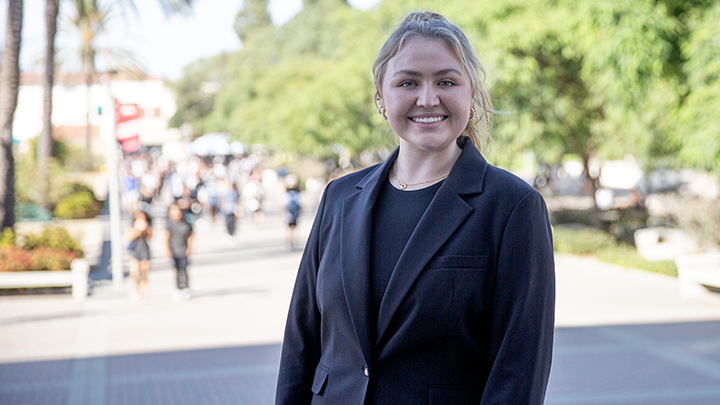SDSU joins NASEM, contributing to sexual violence prevention efforts and research
Members of National Academies of Sciences, Engineering, and Medicine are collectively committed to targeted action on addressing and preventing sexual harassment in higher education.

As part of the San Diego State University’s ongoing efforts to prevent sexual harassment, the university is now a National Academies of Sciences, Engineering, and Medicine (NASEM) Action Collaborative member, joining institutions in addressing gender-based violence nationwide.
NASEM’s Action Collaborative membership comes following a competitive application process, and current members include Boston University, Johns Hopkins University, the Massachusetts Institute of Technology, the National Oceanic and Atmospheric Administration, and others.
The group collectively engage and learn from research experts and practitioners, identify barriers and challenges and identify and commit to research related to sexual violence and prevention.
“As an institution fully committed to tackling this problem holistically, we are incredibly pleased to join with others who have embraced or are creating transformational, proactive practices that will help us to better serve survivors, and create a culture of care and accountability,” said SDSU President Adela de la Torre.
“We recognize that the most marginalized members of our community are the most at risk for harm. Our commitments to prevent sexual harassment, address other forms of gender-based violence, and support survivors are aligned with the NASEM Action Collaborative goals,” de la Torre said.
Created in April 2019, NASEM’s Action Collaborative grew out of a desire among higher education institutions to collaborate and learn from each other in response to the National Academies’ 2018 Sexual Harassment of Women report. By 2020, the collaborative had more than 55 members and, in more recent years, has introduced members outside of the higher education sector. Action Collaborative members have contributed to policy changes and research in the interest of preventing and addressing all forms of sexual violence.
At SDSU, de la Torre established the Blue Ribbon Task Force on Gender-Based Violence in 2023 to assess the urgent problem of sexual assault on our campus and nationally in higher education. The group, which continues to meet, has led a series of listening sessions and webinars and is charged with reviewing SDSU, statewide, and national sexual harassment policies and procedures and recommending strategies to improve these. Task force members are also currently identifying recommendations for opportunities to improve training and prevention.
“We have a solid body of research and empirical evidence that sexual harassment undermines the professional and educational attainment and mental and physical health of people of all genders,” said Monica J. Casper, Special Assistant to the President on Gender-Based Violence, who leads these efforts.
“A holistic, systemic action-oriented approach is the only way to address gender-based violence,” Casper said.
SDSU maintains extensive education activities around student safety, including those for sexual violence and sexual misconduct prevention, beginning with orientation, and including mandatory training for faculty and staff.
Departments and groups also organize events and activities to provide opportunities for safe and welcoming community connections, including Aztec Nights events and other workshops, lectures and other activities.
Also, in earlier years, the Presidential Task Force on Student Activities and Safety report and the Presidential Task Force on Alcohol and Substance Misuse report were each established to implement or enhance educational programs, policies and intervention efforts around student safety and well being, to include sexual misconduct, sexual assault and sexual violence. The work of both groups resulted in: a Hazing Prevention Task Force to combat hazing and to also address alcohol use and misuse and other behaviors; the Good Samaritan Policy for Recognized Student Organizations; and the Amnesty Policy has been implemented for individual students.
“Our approach is a combined focus on compliance, education, accountability, a culture of care and in leading in support for survivors,” said Casper. “Our ongoing work aligns with the NASEM Action Collaborative, and we look forward to sharing and learning additional best practices from our colleagues nationwide.”
An important note
SDSU encourages anyone who is a victim of sexual assault, and anyone who knows someone who has been harmed, to call 911 and report it as soon as possible to police. There are other resources for students, faculty and staff, including the university’s reporting tools, support resources and a victim advocate. Also, the Center for Community Solutions, which operates a 24-hour crisis line in San Diego County at 888-385-4657 for crisis intervention and information and referrals related to sexual assault.
SDSU encourages anyone who is a victim of sexual assault, and anyone who knows someone who has been harmed, to call 911 and report it as soon as possible to police. There are other resources for students, faculty and staff, including the university’s reporting tools, support resources and a victim advocate. Also, the Center for Community Solutions, which operates a 24-hour crisis line in San Diego County at 888-385-4657 for crisis intervention and information and referrals related to sexual assault.



